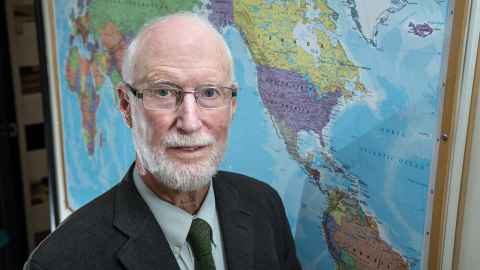Khashoggi killing's harsh but necessary lesson
25 October 2018
The killing of Jamal Khashoggi is shocking. But it is not unprecedented. Journalists around the world are at risk. And the risks are growing. Will academics be next?

The Committee to Protect Journalists (CPJ), an international journalists’ monitoring association, reported that in 2017, 48 journalists were killed. It reported that ‘a record number’ were imprisoned. Three-quarters of the 194 journalists convicted around the world in 2017 were charged with ‘anti-state activities’. Among the worst offenders were the governments of Turkey, Iraq, Syria, India, Mexico, Russia and China, but the list extends much further.
The majority of repressive governments are found in the Middle East. On the Reporters Without Borders (RWB) scale of press freedom, on which Norway is ranked 1st and New Zealand is ranked 8th, Egypt is ranked 161st, Iran is ranked 164th, Saudi Arabia is ranked 169th, and Syria is ranked 177th. (China and North Korea are ranked 176th and 180th respectively.) It is ironic that Turkey, whose government has taken the lead in accusing Saudi Arabia of Khashoggi’s murder, is ranked 157th in press freedom and has imprisoned or blacklisted hundreds of journalists for alleged complicity in the attempted coup of 2016.
CPJ’s inventory of threats to journalists includes the following:
- extrajudicial executions
- hostage-taking by governments
- hostage-taking by non-state actors
- state-sanctioned surveillance
- prosecution under obscure laws
- public smear campaigns
- accusations of assisting terrorists
- censorship of social media
What recourse do journalists, and those who respect their reportage and insights, such as academics and liberal officials, have? In earlier years one might have recommended emigration to a liberal Western country such as the United States. Khashoggi did so when officials in Saudi Arabia, his home, threatened him. Today, however, President Donald Trump, apparently with the approval of a substantial proportion of the American public, has branded the mainstream news media as ‘enemies of the people’. In 2018 the US sank to 45th on the RWB scale. Trump’s assertion of ‘alternative facts’ also clashes with academic research values.
Free speech and a free press, and by extension academic freedom, are not givens but must be actively sought and defended.
Appeal to the judiciary, with the support of liberal lawyers and NGOs, is another route. But in many states such as Turkey and Saudi Arabia the judiciary is aligned with the ruling regime, and protection of individuals’ freedom of speech has low priority in contrast to regime stability and compliance. Even in the US, the ability of the President to appoint justices and judges sympathetic to his administration’s ideology creates headwinds facing journalists in their appeals for ‘equal protection’ and ‘due process of law’.
A third recourse of journalists is to speak out through liberal media and social media. But they face the barrier of self-censorship from media organisations whose CFOs are oriented to advertisers who in turn are loath to condone criticism, controversy and disruption of the prevailing narrative. The outspoken investigative journalism of the New York Times and the Washington Post is all the more remarkable, and commendable, in resisting pressures for conformity and in giving investigative journalists an international platform ‘without fear or favor’. Social media, too, has become a channel of choice, so long as they can escape overt censorship as in China and Turkey.
Ultimately, governments have overwhelming powers of repression, both overt and covert, both legal and illegal. The challenge to journalists is to persuade political leaders that a free press serves their own interests as well as the public interest. They must show that public debate contributes to better policy and builds social consensus that in turn underpins stable and legitimate government.
Inasmuch as many academics also engage in reporting publicly on their research and in offering opinions on public issues, often through the news media, they work in parallel with journalists and should make common cause with them. State censorship, harassment, prosecution, imprisonment, and killing of journalists violate academic values and cast a chill on critical enquiry and assessments by scholars.
Thus Khashoggi’s fate impinges on ours in academia. It has taught a harsh but necessary lesson, that free speech and a free press, and by extension academic freedom, are not givens but must be actively sought and defended. Regimes that would repress these freedoms must be identified and their policies held accountable. The refusal by important financial leaders to attend a Saudi investment conference is a commendable gesture.
So academics should take into account the reports on press freedom by the Committee to Protect Journalists and Reporters Without Borders, and on academic freedom by the monitoring organisation Scholars at Risk, when deciding whether to accept state-sponsored research grants, conference invitations, or media commentary queries in countries hostile to journalistic and academic values.
Then what? The alternatives are: 1) boycott contacts with counterparts in repressive countries; or 2) engage selectively with counterparts so as to recommend, and set an example of, open enquiry and publication. In the long run, engagement will be more constructive.
Dr Stephen Hoadley is an Associate Professor of Politics and International Relations in the Faculty of Arts at the University of Auckland. His research interests span the foreign and security policies of New Zealand, Asia, the United States, Europe and the Middle East, the politics of trade, and international human rights institutions.
This article reflects the opinion of the author and not the views of the University of Auckland.
Used with permission from Newsroom, Khashoggi killing’s harsh but necessary lesson published on Thursday 25 October 2018.